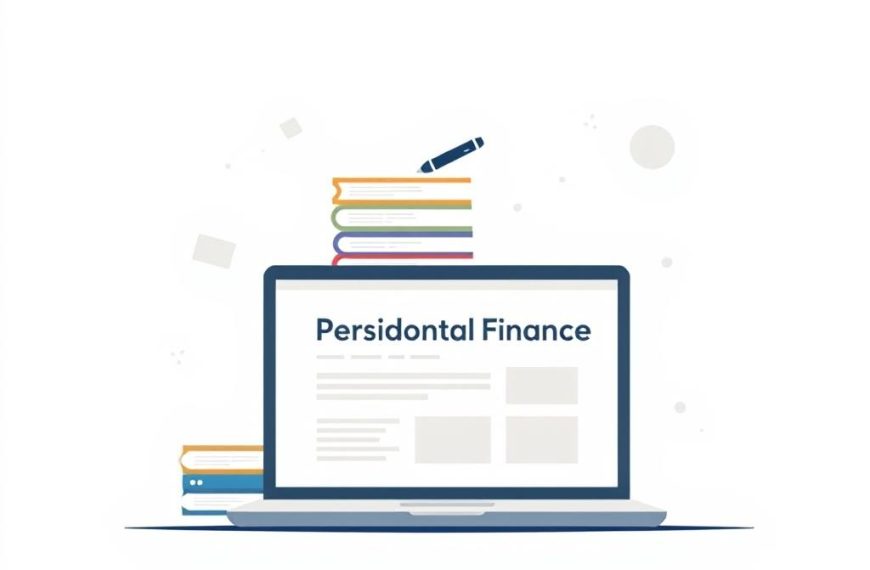Many think personal finance success is all about math. But in truth, it’s more complex. It blends math skills with understanding emotions in finance. Feelings, actions, and personal situations greatly influence financial choices.
Recent studies by Annamaria Lusardi show a gap in financial know-how. Only 43% of Americans got questions on interest rates and risk right. Financial knowledge even less among women, with only 29% passing. This shows a big need for better financial education. Schools like those in Oregon are adding finance to their curriculums. They show that learning about money is key. It can help break cycles of poverty and create stable futures.
There are many ways to learn more about managing money. Websites like Investopedia give important information on personal finance. Plus, podcasts like Her First 100K make learning about money fun and interesting.
Understanding Personal Finance Beyond Numbers
Personal finance is not just about numbers and maths. It also considers the emotional aspects of finance. These emotions greatly influence our financial actions. Understanding finance means blending feelings, goals, and personal situations. This mix shows that making smart money choices often goes beyond mere calculations.
Studies show that people who understand money save 15% more than those who don’t. This underlines how vital financial literacy is for saving better. Learning about money helps people set goals and manage debt. Knowing how to budget, for example, is key for sound financial planning.
Personal finance combines maths with insights from social sciences and psychology. This blend offers a detailed view of managing money. For example, choosing investments involves looking at return on investment (ROI) and understanding the value of different assets. Likewise, managing debt well means knowing how to work out monthly payments and reduce expenses.
Having personal finance in schools can really help students in the long run. Some states, like Pennsylvania, have already made these classes a requirement. This move boosts financial confidence. Teaching the emotional aspects of finance in schools helps with smart decision-making. It also encourages good money habits that last a lifetime.
Math Skills Required in Personal Finance
Maths is key in managing money, especially for budgeting and evaluating finances. Knowing basic maths helps you keep track of what you earn and spend. Skills in adding, subtracting, multiplying, and dividing are crucial for making wise financial choices.
Basic Arithmetic in Everyday Finance
Basic maths helps in creating a budget by calculating total income, outgoings, and savings. For example, to handle monthly expenses, one might add up all their bills. This shows how much money is left after paying for essentials. Such skills prevent overspending and debt, which is vital since many students leave with large loans.
The Role of Percentages and Interest Rates
Understanding percentages and interest rates is crucial for savvy financial moves. These play a big part with loans, credit cards, and saving plans. Learning to work out interest helps people get how loans cost over time. Sadly, few manage to clear their credit card debt each month because they’re not aware of how interest builds up.
Mastering these maths skills lets people handle their money better and dodge financial traps. More schools are now teaching personal finance, a sign that being good at maths is not just helpful but necessary for responsible money management.
Is Personal Finance a Math Class?
Personal finance is more than just numbers. It’s not only about maths. It involves understanding feelings and making choices. Emotional intelligence is key. It affects how we handle money.
The Importance of Emotional Intelligence in Financial Decisions
Emotional intelligence means knowing and managing feelings. It’s vital when making money choices. Emotions play a big part in deciding whether to save or spend.
Maths is useful for budgeting and understanding economics. But personal finance isn’t just about formulas. Feelings like anxiety and confidence also guide our financial choices.
To use emotional intelligence in finance, we can:
- Spot what makes us want to spend.
- Use mindfulness to calm worries about money.
- Choose financial goals that match what we value.
- Talk with mentors to learn about emotions and money.
Using both math and emotional smarts helps us make better money decisions. It’s about balancing heart and mind.
| Emotional Factors | Impact on Financial Decisions |
|---|---|
| Confidence | Encourages investment in growth opportunities. |
| Anxiety | May lead to avoidance of necessary financial actions. |
| Personal Values | Directly influences spending habits and savings priorities. |
| Risk Perception | Affects willingness to engage in high-reward financial opportunities. |
The More Complex Decisions: Emotion vs. Logic
When it comes to money, there’s more than simple maths involved. Our feelings and logical thinking both play big roles. This is especially true for big decisions like choosing to buy a home or manage debts.
The Debate: Buying vs. Renting a Home
Deciding whether to buy or rent a house brings out different emotions. People consider both the money side and their feelings towards having a stable home. While numbers show which option is more cost-effective, the urge to own a home often wins. This is because many see having their own home as a sign of success. This makes them choose buying over renting, even if it’s not the best financial choice.
Investing in Stocks vs. Paying Off Debt
Choosing to invest in stocks rather than paying off debt also mixes feelings with finance. The chance to make money from stocks can be very appealing. This is true especially when the stock market is doing well. However, the emotional satisfaction of being debt-free is powerful too. It leads many to focus on clearing debts first. People find themselves torn between the emotional and logical sides of financial decisions.
| Decision Type | Emotional Factors | Logical Considerations |
|---|---|---|
| Buying vs Renting | Stability, Commitment, Pride | Cost-effectiveness, Mortgage Payments |
| Investing in Stocks | Potential Gain, Excitement | Risk Assessment, ROI Analysis |
| Paying Off Debt | Satisfaction, Freedom from Burden | Interest Rates, Financial Health |
The Role of Financial Education
Today, learning about finance is more important than ever. It helps people manage their money and plan for the future. Sadly, many young adults lack this knowledge. This gap can make saving for retirement harder and lead to more debt. By learning from books, online courses, and workshops, individuals can make better financial choices.
How Self-Education Influences Money Management
Learning about finance on your own boosts independence with money matters. People who seek out financial knowledge tend to budget wisely, pay bills on time, and save effectively. Without this effort, it’s easy to fall into financial trouble. This can push people towards risky loans. So, understanding finance yourself is key to avoiding money problems.
Integrating Personal Finance into School Curriculums
Adding financial lessons to school programs is becoming crucial. Shockingly, fewer than one in four millennials really understand finances. Schools need to teach personal finance skills. Some states are now making these classes a must for graduation. The goal is to make young people more financially savvy and careful with money.
| Impact of Financial Education | Groups Benefiting | Key Advantages |
|---|---|---|
| High School Courses Mandated | All Students | Foundation for future financial literacy |
| Targeted Programmes in Underserved Areas | Predominantly Black and Hispanic Students | Equitable access to critical financial skills |
| Community-Based Education Initiatives | General Public | Increased awareness and resilience |
| Incarcerated Individual Programmes | Formerly Incarcerated Individuals | Support reintegration with essential knowledge |
Financial education is vital for building a society that understands money well. By focusing on self-education and adding finance lessons to schools, we’re preparing a generation to confidently handle economic challenges.
Practical Application of Personal Finance Skills
Understanding how to apply personal finance skills can change how well you manage money. By focusing on key financial habits, you create a solid base for success. Learning to save, invest, and spend wisely sets you up for financial growth.
Building Wealth Through Consistent Habits
Wealth building isn’t just about earning more. It’s about good money habits that help secure and grow your finances. Important habits include:
- Disciplined Savings: Saving a certain amount monthly creates a safety net for emergencies.
- Informed Investing: Knowing your investment options can help your money grow.
- Prudent Spending: Thinking carefully about buying helps save for big future goals.
Adding these habits to daily life leads to financial security later on.
Utilising Resources for Financial Clarity
Tools and resources are key in handling money well. Budgeting apps and calculators offer guidance. Here’s a table of useful tools:
| Financial Tool | Features | Benefits |
|---|---|---|
| Mint | Budget tracking, bill reminders, goal setting | Gives a full view of money to help manage spending |
| YNAB (You Need A Budget) | Real-time budgeting, educational resources | Makes saving a priority and boosts money knowledge |
| Acorns | Investment of spare change, portfolio management | Makes investing easy and passive for wealth building |
| Credit Karma | Credit score monitoring, personalised financial recommendations | Aids in improving and understanding credit scores |
Using these tools makes managing money simpler. With consistent effort and these aids, you can secure a financially bright future.
Conclusion
Navigating finance is more than just numbers. It’s crucial to blend emotional smarts with practical knowledge for wise financial choices. This teaches us how to use both math and understanding of our financial life.
Studies show we need a well-rounded approach to learning about money. Students in states with Personal Finance classes do better financially. But, there’s a big need for a deeper grasp of money matters. Learning basic concepts helps develop good money habits. For more insights, look at the value of knowing about compound interest and financial planning here and here.
Building a strong financial education can fight wealth inequality. It’s about mixing math skills with understanding the emotional and ethical parts of money. This way, people can manage their money better. They’ll also help make society fairer.
FAQ
What is personal finance?
Personal finance is about managing your money. This includes budgeting, saving, investing, and planning for future costs. It involves math skills and emotional intelligence. These influence your money choices.
How important is emotional intelligence in personal finance?
Emotional intelligence is key in personal finance. Feelings can greatly influence how we handle money. Understanding emotions is vital for good budgeting, saving, and investing choices.
Do I need advanced math skills to manage my personal finances?
No, advanced math is not needed for personal finance. Basic math helps with budgeting and managing cash flow. Knowing about percentages and interest rates is useful for loans and investments.
Can emotional factors affect buying versus renting a home?
Yes, emotions affect the choice to buy or rent. Besides math, feelings of stability and pride matter. They influence this big decision.
How can self-education improve my financial literacy?
Self-education boosts financial knowledge. Books, online courses, and podcasts teach key finance concepts. This helps you make better money decisions.
What are some effective financial habits to build wealth?
Saving diligently, investing wisely, and spending carefully build wealth. Being consistent in managing money helps achieve financial growth over time.
Why is it essential to integrate personal finance education into schools?
Teaching finance in schools prepares young people with skills. It makes them more capable of making smart money choices. This leads to better financial lives.


















